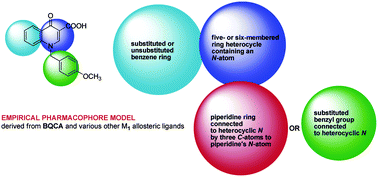Despite the tremendous advances in investigating the molecular mechanisms of Alzheimer’s disease and its relevance for society there is an alarming lack of drugs for clinical treatment. Apart from the NMDA antagonist memantine, several acetylcholinesterase inhibitors have been approved for symptomatic treatment of early stages of Alzheimer’s disease.
In this MedChemComm review Michael Decker and Ulrike Holzgrabe present a review of the different chemical structures of allosteric agonists and modulators of the muscarinic acetylcholine receptor subtype 1 (mAChR1 or M1) and their relevance for possible treatment of Alzheimer’s disease. The discussion also focuses on:
- Their design principles,
- Common structural properties,
- Unique features with regard to structure–activity relationships (SARs)
M1 muscarinic cetylcholine receptor allosteric modulators as potential therapeutic opportunities for treating Alzheimer’s disease
Michael Decker and Ulrike Holzgrabe
DOI: 10.1039/C2MD20025B











